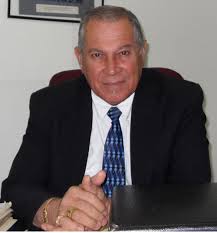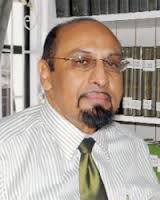
Bernard De Santos
Amid criticisms of the local magistracy regarding the handling of a number of matters, Senior Council and former Attorney General Bernard De Santos has called for a review of requirements for persons sitting on the bench.
Speaking with Guyana Times International, De Santos said the current requirements are inadequate. “Frankly, I don’t think it’s enough, they are virtually little children being appointed as magistrates,” said De Santos as he referred to the age of some of the sitting magistrates.
Currently, persons must have a first degree and three years in legal practice to be considered for the post by the Judicial Service Commission.
According to De Santos, persons wanting to become magistrates usually spend three years working at either the Office of the Director of Public Prosecutions (DPP) or the Office of the Attorney General before they are appointed to serve on the bench.
He said law professionals who would have served at the Office of the DPP would have some experience in criminal law, but little or none in civil law.

K A Juman-Yassin
On the other hand, he said those at the Office of the Attorney General would have a lot of experience in civil law but none in criminal law.
Those in the latter situation, he explained are at a grave advantage when they go on to become magistrates because most of the courts in Guyana are criminal courts, with the exception of Courts Eight and Nine at the Georgetown Magistrate’s Court.
Flirting with the law
“They only flirt with the criminal law, they don’t have the necessary experience to effectively sit on the bench as a magistrate,” De Santos observed.
The practising attorney pointed out that some years back, he suggested to the serving chancellor at that time that prospective law professionals decide what branch of law they want to pursue before they embark on their law careers.
This system, he explained, would allow for persons who want to become criminal magistrates, to be exposed to the work of a criminal magistrate, as a form of specialisation.
Likewise, those who want to become state prosecutors would be trained in that area of law.
The Senior Council also said that some reform is also needed at the level of government.
He pointed out that a law that was passed in Parliament under the Burnham administration allowed for the salary of the Attorney General and Chancellor of the Judiciary to be the same.
This, he said should not be, contending that the Chancellor of the Judiciary is superior to the Attorney General.
Still on the issue of salaries, he said the packages that magistrates and judges receive are meagre, compared to what they could earn as an attorney. “I don’t expect them to pay the high salaries like the other countries but they can do a lot better,” he said, noting that the government could enhance the salaries of magistrates by providing adequate allowances.
De Santos believes that this move would persuade serving magistrates to stay on the bench, and attract more seasoned lawyers to the post.
Former Chief Magistrate K A Juman-Yassin also contended that the salaries of magistrates are inadequate, and called for seasoned attorneys to serve on the bench.
He said some magistrates are appointed to the bench at a young age and have little experience handing cases involving criminals, and as such, are not fully knowledgeable regarding the thinking of these people.
The former Chief Magistrate also noted that the influx of young magistrates can be attributed to the reluctance of more seasoned attorneys to become magistrates.
Only recently, former Chancellor Cecil Kennard also decried the state of the local magistracy. Kennard said the appointment of too many young magistrates and judges to the bench can be blamed for the current backlog of cases and slothfulness of the justice system
Acting Chancellor of the Judiciary, Justice Carl Singh has also spoken on the matter, pointing out that both magistrates and prosecutors must equip themselves with the requisite skills that will make them more effective in executing their duties.
The acting chancellor had said that this is essential to ensure better legal services at the magisterial level, while calling for more training to be provided for other legal professionals as well.



